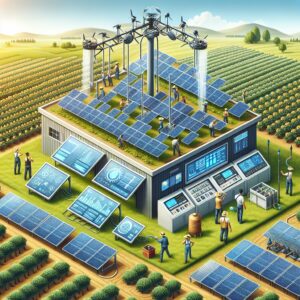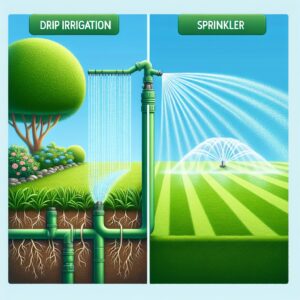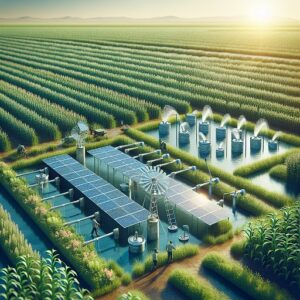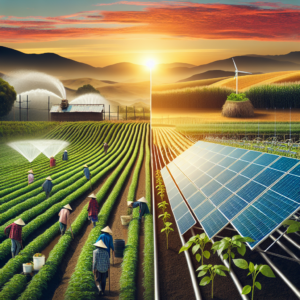When we talk about farming, the first thing that might come to mind is vast fields, tractors, and the hard work of tilling the land. But there’s a quiet revolution happening on farms around the world – a shift towards harnessing the power of the sun with portable solar panels. It’s a game-changer for energy use in agriculture, and it’s something every farmer should know about.
Now, let’s dive right into how portable solar panels are not just good for the environment, but also for a farm
Key Takeaways
-
Portable solar panels can significantly reduce electricity costs for farmers.
-
They offer flexibility and energy independence, especially in remote areas.
-
With portable solar panels, farmers can extend their growing seasons and introduce new high-value crops.
-
They contribute to sustainable farming practices by reducing water consumption and carbon footprint.
-
Grants and incentives may be available to help offset the initial investment in solar technology.
Shining a Light on Portable Solar Panels in Agriculture
Solar energy is a beacon of hope for a sustainable future, and its impact on agriculture is profound. The advent of portable solar panels has brought a new dimension to farming – one where clean, renewable energy is readily available. For farmers, this means more than just an alternative to conventional power sources; it’s a step towards self-reliance and resilience in a world where energy costs are volatile.
But what exactly are portable solar panels? Think of them as your personal pocket-sized sun. These are compact, movable solar panels that you can set up wherever you need power. Unlike their larger counterparts, portable solar panels are designed for ease of use and can be a perfect fit for various agricultural needs.
Let’s walk through the ways portable solar panels are revolutionizing farms and why they might just be the smartest investment you can make for your agricultural operations.
Empowering Farms with Renewable Energy with Portable Solar Panels
Imagine having the power to harness the sun’s energy wherever and whenever you need it. That’s the beauty of portable solar panels. They empower you to generate electricity on-the-go, ensuring that your farm’s operations never skip a beat. This is especially crucial in remote areas where grid electricity is unreliable or unavailable.
Economic Advantages for The Long Haul
While the initial cost of portable solar panels might seem daunting, they are an investment that pays for itself over time. By slashing your monthly electricity bills, these solar solutions put money back in your pocket. And with various financial incentives available, such as tax credits and grants, the cost of going solar is more attainable than ever.

Benefits of Using Portable Solar Panels on a Farm
Using solar energy on your farm has numerous of benefits, and with portable panels, you can take advantage of them wherever you need it. Here are just a few reasons why you should consider incorporation portable solar panels into your farm.
1. Electricity Cost
One of the most immediate benefits of portable solar panels is the reduction in electricity costs. By generating your own power, you’re less reliant on the grid and protected from the price hikes that come with traditional energy sources. Over time, these savings can be substantial, allowing you to allocate funds to other areas of your farm.
For example, if you’re currently paying $200 a month for electricity, a well-sized solar panel system could cut that cost significantly. Even a modest system could save you half of that bill, and as you scale up, you might be able to eliminate your electricity cost altogether.
“A neighbor of mine switched to portable solar panels for his irrigation system and saw his monthly energy bill drop by 60%. That’s real money that can go back into his farm.”
2. Revenue Stream Diversification
Beyond just savings, portable solar panels can open up new revenue streams. In some regions, you can sell excess electricity back to the grid through net metering programs. This not only offsets your costs further but also turns your solar panels into a source of income.
3. Greater Ability to Introduce Shade-Resistant, Higher-Value Crops to New Markets
Portable solar panels can also lead to agricultural innovation. By providing power in fields, you can experiment with shade-resistant crops that may fetch higher prices in the market. This diversification can lead to greater financial stability and an edge in competitive markets.
Consider the story of a farmer who used portable solar panels to power a small greenhouse. He was able to grow specialty herbs that weren’t feasible in his region before, tapping into a lucrative niche market that significantly boosted his farm’s profitability.
4. Reduced Water Consumption
With climate change and water scarcity becoming more pressing issues, every drop counts. Portable solar panels can power irrigation systems that use water more efficiently, ensuring that crops get exactly what they need without waste. This not only conserves water but also reduces your utility bills even further.
5. Possibility of Extending the Growing Season
By using solar power to run greenhouses, you can extend the growing season for certain crops. This means you can start planting earlier in the year and keep harvesting later into the fall, maximizing your farm’s output and revenue potential.

Versatility of Portable Solar Panels
In the next section, we’ll delve into the versatility of portable solar panels. How they can be integrated into various farming operations seamlessly. Stay tuned to discover practical tips on setting up and maintaining your solar toolkit. We will also talk about how to make the most of this innovative technology for a more sustainable and profitable farm.
This below table illustrate the versatility of portable solar panels in addressing specific and dynamic energy needs on a farm. The portability and flexibility of these panels make them valuable for various applications across different areas of the farm.
| Use Case | Description |
|---|---|
| Remote Power Needs | Providing power to remote areas of the farm where traditional power sources are not easily accessible. |
| Temporary Installations | Supporting temporary installations such as events, field stations, or construction sites on the farm. |
| Emergency Power | Serving as an emergency power source during outages, ensuring critical farm operations continue. |
| Irrigation Pumping | Powering portable solar pumps for irrigation purposes in different areas of the farm as needed. |
| Livestock Watering | Supplying energy for portable water pumps to ensure livestock have access to water across the farm. |
| Equipment Charging | Charging portable electric tools, devices, and equipment used in various farm operations. |
| Off-Grid Operations | Enabling off-grid operations in locations where connecting to the main power grid is impractical. |
| Seasonal Energy Needs | Supporting additional energy needs during specific seasons, such as heating or cooling requirements. |
| Crop Monitoring Systems | Powering sensors and monitoring systems for precision agriculture, helping optimize crop management. |
| Mobile Workstations | Providing power for mobile workstations, allowing farm workers to operate equipment in different areas. |
Setting Up Your Solar Toolkit
Getting started with portable solar panels is easier than you might think. First, assess your energy needs. This will depend on what you’re powering – a water pump, greenhouse lights, or electric fences, for example. Next, choose panels that match your requirements. Look for panels with a high wattage rating for more power-hungry applications. You’ll also need batteries to store the energy you generate, a charge controller to protect your batteries, and an inverter to convert the solar power into usable electricity. Remember, the sun doesn’t charge your devices directly; it charges the batteries that then power your equipment.
Solar Maintenance Made Simple
Maintaining your portable solar panels is straightforward. Keep them clean and free of debris, which can block sunlight and reduce efficiency. Check connections regularly to ensure they’re secure and corrosion-free. Batteries will also need periodic checks and may need to be replaced every few years, depending on usage. The good news is, with fewer moving parts than traditional machinery, solar panels require much less upkeep, saving you time and hassle.

Differences between Portable Solar Panels and Traditional Solar Panels
When it comes to solar solutions, not all panels are created equal. Traditional solar panels are usually installed on rooftops or large structures and are meant to stay in one place. They’re great for generating a lot of power, but they lack flexibility. Portable solar panels, on the other hand, are designed to move with you. They’re smaller, lighter, and can be set up quickly wherever you need them. This makes them ideal for a variety of farming applications where mobility is key.
The table below summarizes the differences between portable solar panels and traditional solar panels.
| Aspect | Portable Solar Panels | Traditional Solar Panels |
|---|---|---|
| Mobility and Flexibility | Portable panels are designed for easy mobility and can be moved to different locations as needed. | Traditional panels are fixed installations and cannot be easily relocated once installed. |
| Installation | Portable panels are typically easier to install and may not require professional installation. | Traditional panels often require professional installation due to their fixed nature and complexity. |
| Size and Capacity | Portable panels are generally smaller in size and have lower capacity compared to traditional panels. | Traditional panels are larger and can provide higher energy output due to their fixed and optimized design. |
| Energy Output | Portable panels may produce less energy compared to traditional panels due to their smaller size. | Traditional panels can generate higher energy output, making them suitable for larger energy needs. |
| Use Cases | Portable panels are ideal for temporary or off-grid applications, such as camping or remote power needs. | Traditional panels are suited for permanent installations, like residential or commercial solar power systems. |
| Ease of Expansion | Portable systems are easily expandable by adding more panels to meet increased energy demands. | Traditional systems can also be expanded, but it may involve more complex modifications to the existing setup. |
| Cost | Portable panels are often more affordable upfront, making them accessible for smaller budgets. | Traditional panels may have a higher initial cost, but they may offer better long-term returns on investment. |
| Aesthetics | Portable panels are more flexible in terms of placement and may have less impact on the visual aesthetics of an area. | Traditional panels may be considered less aesthetically pleasing and can impact the visual appeal of a property. |
| Durability | Portable panels are designed to be lightweight and may be less durable compared to traditional panels. | Traditional panels are built to withstand various weather conditions and have a longer lifespan. |
| Integration with Grid Systems | Portable panels are less likely to be integrated into the grid and are often used for standalone applications. | Traditional panels are commonly integrated into the grid, allowing for net metering and selling excess energy back to the grid. |
Portable solar panels give you the freedom to use them in different locations and for various applications, a versatility that’s not possible with traditional fixed panels.
On-Demand Energy for Agricultural Operations
Portable solar panels provide on-demand energy, making them perfect for the unpredictable nature of farming. They can power a wide range of equipment, from small sensors to large irrigation systems, providing a reliable energy source right where it’s needed.
Aiding Irrigation and Crop Production with Portable Solar Panels
For irrigation, portable solar panels can run pumps that deliver water precisely when and where it’s needed, optimizing water usage and supporting crop production. This not only saves water but also ensures that crops get the right amount of moisture, even during dry spells. By using solar power for irrigation, you’re investing in the long-term health of your land and the sustainability of your farming practice.
Keeping Livestock Safe and Secure with Portable Solar Panels
Portable solar panels also play a crucial role in livestock management. They can power electric fences, keeping animals safe from predators and within designated grazing areas. In addition, they can run surveillance systems, ensuring that you can keep an eye on your livestock at all times, which is essential for their well-being and your peace of mind.
-
Electric fencing powered by solar panels ensures livestock safety without ongoing electricity costs.
-
Surveillance systems powered by solar maintain security and reduce the need for manual checks.
These are just a few examples of how portable solar panels can support your agricultural operations, making them more efficient and sustainable.

Cost-Effective Power for Modern Farming
One of the biggest draws of portable solar panels is their cost-effectiveness. By providing your own power, you’re less reliant on the grid, which can lead to significant savings on your energy bills. This is particularly important for farmers, as energy is one of the largest expenses in agriculture.
Trimming Energy Expenses
By using portable solar panels, you’re generating free energy from the sun. After the initial investment, the ongoing costs are minimal compared to traditional energy sources. This means you can put more of your hard-earned money back into your farm, whether it’s for buying seeds, investing in new equipment, or expanding your operations.
Eligibility for Incentives and Grants
Many governments and organizations offer incentives to encourage the adoption of renewable energy. These can take the form of tax credits, rebates, or grants, all of which can make the switch to solar power more affordable. It’s worth doing some research to see what’s available in your area. You might be surprised at how much you can save.

Success Stories: Harnessing the Sun on Farms Worldwide
Across the globe, farmers are reaping the benefits of portable solar panels. In sunny countries like Spain and Italy, vineyards use solar power to run irrigation systems. This reducing their reliance on grid electricity. In the United States, dairy farms are using solar panels to power milk coolers, cutting energy costs and reducing their carbon footprint.
Innovating in Energy Independence
One inspiring example comes from a farm in California that installed portable solar panels to power its operations. Not only did they see a dramatic drop in their energy bills, but they also gained a measure of energy independence that protected them from grid outages and fluctuating energy prices.
As we wrap up this section, remember that portable solar panels are more than just an alternative energy source. They’re a smart investment that can help modernize your farm, cut costs, and contribute to a sustainable future. In the final part of this article, we’ll answer some frequently asked questions and conclude with some thoughts on whether portable solar panels are a good fit for your farming needs.
Frequently asked questions can shine a light on areas that might not have been clear or addressed earlier. So, let’s tackle some of the common queries farmers might have about portable solar panels and their use on the farm.
Frequently Asked Questions (FAQ)
How Do Portable Solar Panels Help During Power Outages?
Portable solar panels are a lifeline during power outages. They provide an independent power source that can keep essential farm operations running when the grid is down. With a battery storage system in place. You can store excess energy generated during the day to use when it’s needed most, ensuring that your farm can continue functioning, even during extended outages.
For example, during a power outage, solar panels can keep your refrigeration units running, preserving perishable goods like dairy products or fresh produce. This can be crucial in preventing significant financial losses.
Can I Use Solar Panels If My Farm Is Not Fully Sunny?
Yes, portable solar panels can still generate electricity on cloudy days, although at reduced efficiency. The key is to size your system appropriately. If you live in an area with less sunshine, you may need more panels to meet your energy needs. Solar technology has advanced to the point where even diffused sunlight can be converted into useful energy.
Is It Possible to Run Heavy Machinery on Portable Solar Panels?
Running heavy machinery solely on portable solar panels can be challenging due to the high energy demand. However, solar energy can contribute to the power supply, reducing the reliance on traditional sources. For heavy machinery, a hybrid system that combines solar power with other forms of energy may be the most practical solution.
How to Calculate the Number of Panels Needed for My Farm?
To calculate the number of panels needed, you’ll first need to determine your daily energy usage. Once you have that figure, consider the average hours of sunlight your location receives and the wattage of the panels you’re considering. A simple formula is to divide your daily energy requirement (in watt-hours) by the product of the panel’s wattage and average sun hours. This will give you an estimate of the number of panels needed to meet your energy needs.
What Should I Do With My Portable Solar Panels in Cases of Extreme Weather?
In cases of extreme weather, it’s best to secure or store your portable solar panels to prevent damage. Most panels are designed to withstand normal weather variations, but high winds, hail, or heavy snowfall can pose a risk. If a severe weather warning is issued, disconnect and store your panels in a safe place until the risk has passed.
Conclusion: Are Portable Solar Panels a Good Fit for Farming
To sum it up, portable solar panels offer a wealth of benefits for farming. They provide a cost-effective, flexible, and sustainable source of energy that can lead to significant savings and increased efficiency on the farm. With the ability to power everything from irrigation systems to electric fences, they’re an invaluable asset for today’s farmers.
Of course, every farm is different, and what works for one may not work for another. It’s important to assess your individual needs, consider the financial incentives available, and weigh the long-term benefits against the initial investment. But for many farmers, portable solar panels have proven to be a smart choice that supports both their business and the environment.
As we continue to face the challenges of climate change and rising energy costs, the shift towards renewable energy sources like solar becomes more than just a trend – it’s a necessity. Portable solar panels are not just a band-aid solution; they’re part of a larger movement towards a more resilient and sustainable agricultural sector. So, if you’re looking to future-proof your farm, reduce your carbon footprint, and take control of your energy costs, portable solar panels might just be the way to go.






